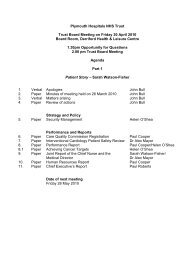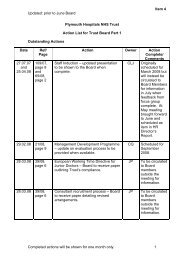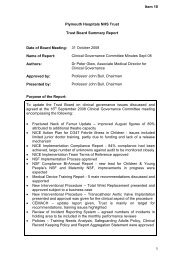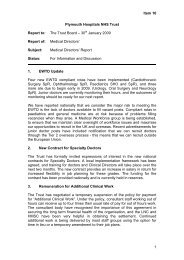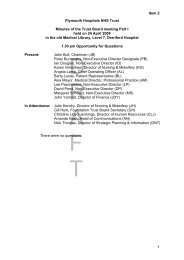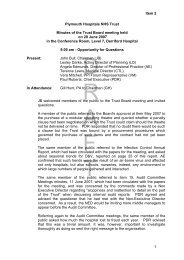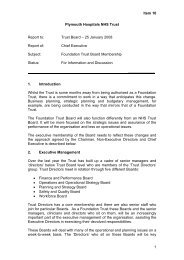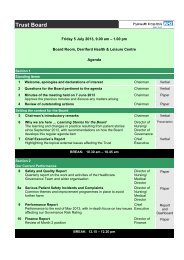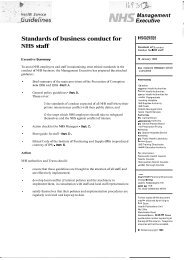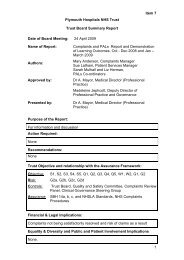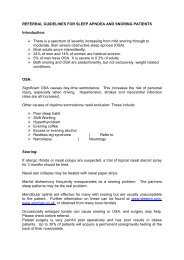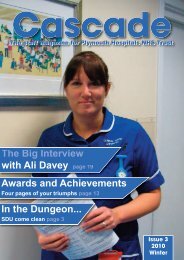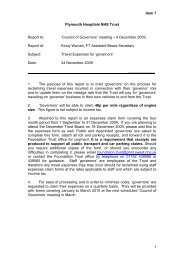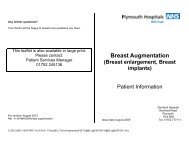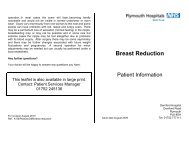Peninsula Allergy Conference - Plymouth Hospitals NHS Trust
Peninsula Allergy Conference - Plymouth Hospitals NHS Trust
Peninsula Allergy Conference - Plymouth Hospitals NHS Trust
You also want an ePaper? Increase the reach of your titles
YUMPU automatically turns print PDFs into web optimized ePapers that Google loves.
Spring 2010<br />
<strong>Peninsula</strong> <strong>Allergy</strong><br />
<strong>Conference</strong><br />
RSM meets at Dartington: see page 4<br />
Also in this issue ...<br />
Wayfinder The new hospital signage system: page 9<br />
Research Nurses The roles that Research Nurses play: page 14<br />
The Big Interview Dr Tony Falconer, Consultant Gynaecologist: page 18<br />
Cascade
IN THIS ISSUE<br />
Message from the Editor<br />
Cover photo: Jane<br />
Gwilliam, Associate Clinical<br />
Nurse Specialist, Dr<br />
Rashni Jain, Immunology<br />
Specialist Registrar,<br />
Christine Symons,<br />
Immunology Nurse<br />
Specialist, Dr Edward<br />
Kaminski, Consultant<br />
Immunologist, Dr Claire<br />
Bethune, Immunology<br />
Welcome to the Spring edition of Cascade.<br />
It has been quite an eventful few months. As you can see from the front page, the <strong>Trust</strong> has been<br />
involved in organising the region’s first <strong>Peninsula</strong> <strong>Allergy</strong> <strong>Conference</strong>. You can learn more about this<br />
in the ‘Sharing Expertise’ section on pages 4–8. The <strong>Trust</strong> has also recently been delighted to find<br />
out that Dr Anthony Falconer has been elected as the President of the Royal College of Obstetricians<br />
and Gynaecologists. Tony discusses his current role and what the new appointment will mean for<br />
him and the <strong>Trust</strong> in the Big Interview on page 18.<br />
As always, I am delighted to be able to acknowledge so many of you for your sterling work and<br />
achievements and to highlight the awards you have received for your efforts. Check out pages 12 and 13.<br />
Also in this edition, you can find out interesting news from around the <strong>Trust</strong>, including the great work<br />
of different teams working in a variety of specialities and applaud different teams and members of<br />
staff for their fundraising efforts.<br />
I hope you enjoy reading this edition of Cascade and are perhaps thinking of ways in which you can<br />
appear in a future magazine. I would love to hear from you, so let me know what you are doing,<br />
what you have achieved or how you are raising money and I will do my very best to accommodate<br />
your stories. Get in touch soon though, as the next magazine is already filling up fast.<br />
Laura Young, Communications Officer, Editor<br />
Contents<br />
If you would like<br />
to request this<br />
document in a larger<br />
or alternative format<br />
please contact:<br />
Laura Young<br />
Communications<br />
Officer<br />
T: 0845 1558207<br />
Ext: 52783<br />
E: Laura.Young@phnt.<br />
swest.nhs.uk<br />
6<br />
3 News from Around the <strong>Trust</strong><br />
Meldon Ward’s temporary winter operation<br />
4–8 Sharing Expertise<br />
<strong>Peninsula</strong> <strong>Allergy</strong> <strong>Conference</strong>; Breastfeeding<br />
Peer Supporters; HCA Presentation day;<br />
Mattress Training; Advances in Acute Medicine<br />
<strong>Conference</strong> 2010<br />
9 Wayfinder<br />
The new, clearer hospital signage system<br />
10–11 Charity Work and Fundraising<br />
Your achievements in aid of others<br />
12 Awards and Achievements<br />
<strong>Plymouth</strong> Hospital Radio scoops two top awards<br />
13 Masanga – Creating Life<br />
Supporting a hospital in Sierra Leone<br />
The next issue is already a<br />
work in progress. If you have<br />
any ideas, stories and letters<br />
that you would like included,<br />
then please let us know in<br />
good time. We also welcome<br />
any suggestions on how<br />
you think Cascade could be<br />
improved.<br />
DEADLINE FOR<br />
NEXT EDITION:<br />
Friday 9th July 2010<br />
Design and print by<br />
Newton Print, Newton Abbot,<br />
Devon. Tel: 01626 368986<br />
www.newtonprint.co.uk<br />
10<br />
17<br />
14 Research Nurses<br />
A valuable service explained<br />
15 Guardian Angel<br />
A special thank you<br />
15 Still Going Strong<br />
The 90-year-old member of the Pastoral Team<br />
16 Retirements & Farewells<br />
17 Derriford Cricket Match<br />
18 The Big Interview<br />
Dr Tony Falconer, Consultant Gynaecologist<br />
19 WHO Checklist<br />
Surgical safety for operating theatres<br />
20 Staff Lottery<br />
Recent lucky winners and successful bids<br />
2 Spring 2010 Cascade
NEWS FROM AROUND THE TRUST<br />
Meldon Ward – A Winter Break?!?<br />
Meldon Ward re-opened in October 2009 as<br />
a medical escalation ward to help with the<br />
winter pressure on admissions and in a role<br />
for which it had been used in the previous<br />
year, and was finally closed in April of this<br />
year. This time there was a difference. Rather<br />
than being managed and run solely by<br />
<strong>NHS</strong> Professional Staff (<strong>NHS</strong>P), registered<br />
nurses and Healthcare Assistants (HCAs)<br />
from a variety of wards within the <strong>Trust</strong>, who<br />
volunteered and were released to work as<br />
part of a new and special temporary team on Meldon.<br />
Davina Finch from Moorgate Ward became Ward Manager,<br />
supported by two acting junior sisters, Jen White also from<br />
Moorgate and Lucy Friggens from Honeyford Ward, bringing<br />
a variety of experience as well as providing an opportunity for<br />
great professional development. Registered Nurses, Donna,<br />
Carlos, Lincy and Claire, and Healthcare Assistants, Kath, Rosa,<br />
Avril, Ben, Lizzie, Janice and ward clerk Sarah all came from<br />
different specialities and brought to the team a wide range of<br />
knowledge, skills and expertise. For most of the team this meant<br />
stepping out of their comfort zones to gain new experiences!<br />
Regular <strong>NHS</strong>P nurses and Healthcare Assistants, Jac, Caroline,<br />
Susan, Tanya, Arthur and Teresa (to name a few) joined the<br />
team contributing to the high standard and good continuity of<br />
care.<br />
The ward opened as a 24-bedded unit caring for general<br />
medical patients and incorporating the Discharge Lounge. As<br />
the pressures began to rise on medical beds the ward increased<br />
to 34 beds and included specialist endocrinology. Meldon<br />
Student Debate<br />
Two teams of medical students from the <strong>Peninsula</strong> Medical School (PMS)<br />
took part in the Second Annual Student Debate held by the <strong>Plymouth</strong><br />
Medical Society at Derriford Postgraduate Medical Centre on Wednesday<br />
21 April.<br />
Presided over, and kept in order by His Honour Judge William Taylor, the motion<br />
was that “This house believes that the shorter working week has more to do<br />
with social engineering than the delivery of quality medical care”, proposed by<br />
Caoimhe Geehan supported by Fisayumi Shobayo, and opposed by Charlotte<br />
Clifford supported by Henry Murphy.<br />
The opposition won convincingly, and were presented with the Richard Dunning<br />
Cup by its donor, Mr William Gall FRCS. A trophy cabinet is being prepared for its<br />
display in the John Bull building on the <strong>Plymouth</strong> Campus.<br />
The PMS website gives details of each seasons’ meetings, at<br />
www.plymouthmedicalsociety1794.org.<br />
The Meldon Ward team<br />
Ward had its own medical team of doctors under the care of<br />
Dr Chong, Diabetics Consultant, then Dr Flanagan, Consultant<br />
Physician; a regular Physiotherapist, Occupational Therapist,<br />
Pharmacist and Discharge Co-ordinator. Credit should go to all<br />
those involved for creating and sustaining a whole new multidisciplinary<br />
team and enabled the care to be delivered at a high<br />
standard meaning that the patients’ experiences were extremely<br />
positive, staff added to their own experience and the ward as a<br />
whole became a great success!<br />
Davina, Ward Manager said: “We would like to thank everyone<br />
who was involved in the achievement of Meldon Ward at every<br />
level, from the management to the nursing staff, the doctors to<br />
the multi-disciplinary team members.<br />
“It is to everyone’s credit that such a large number of staff can<br />
come from every corner of the hospital and re-group in order<br />
to create a new and successful professional team. As well as<br />
working well together, everyone enjoyed their time on Meldon<br />
Ward, gained new experiences and actually was quite sad to<br />
see the ward come to an end this April. Thanks to everyone and<br />
well done Team!”<br />
Senior Medical<br />
Staff Mentoring<br />
Programme<br />
One of the tasks on the<br />
‘wish list’ of the Hospital<br />
Medical Staff Committee<br />
(HMSC) Chairman, Dr<br />
Peter Rowe, was to<br />
reinstate a structured<br />
welcome to all new <strong>Trust</strong><br />
Senior Medical Staff.<br />
Dr Ruth Ayling<br />
The Chief Executive, Mr<br />
Paul Roberts, has added his support and<br />
resurrected the new Senior Medical Staff “Tea<br />
Party”, the first being on Monday 10 May at<br />
4.00pm until 5.30pm in the Post Graduate<br />
Medical Centre.<br />
And after considerable thoughtful planning, Dr<br />
Ruth Ayling, Consultant Chemical Pathologist,<br />
with the help of the Deanery’s consultant Lisa<br />
Baxter, is launching the New Senior Medical<br />
Staff Mentoring Programme. This will be<br />
specifically targeted to welcome all new senior<br />
medical staff from the 1st July 2010 but is<br />
already available to all existing senior medical<br />
staff. Any questions? Contact Gillian Pugh,<br />
HMSC Office on 39491.<br />
Cascade<br />
Spring 2010<br />
3
SHARING EXPERTISE<br />
<strong>Peninsula</strong> <strong>Allergy</strong> <strong>Conference</strong><br />
On Friday 23 April, a conference took place in Dartington<br />
Hall under the auspices of the Royal Society of Medicine<br />
(RSM) entitled ‘<strong>Peninsula</strong> <strong>Allergy</strong> <strong>Conference</strong>’. This was<br />
the first regional meeting of the ‘Immunology and <strong>Allergy</strong>’<br />
section of the RSM in its history.<br />
The scientific content of the meeting was put together by<br />
the Department of Clinical Immunology & <strong>Allergy</strong> of <strong>Plymouth</strong><br />
<strong>Hospitals</strong> <strong>NHS</strong> <strong>Trust</strong> and approximately 125 delegates attended<br />
the meeting, predominately from Devon and Cornwall, but<br />
also from as far afield as Somerset, Gloucestershire, Bristol<br />
and Wales. These included general practitioners, hospital<br />
consultants, trainee doctors, and specialist nurses.<br />
The speakers included internationally and nationally renowned<br />
experts in the field of allergy: Dr Ignacio Ansotegui, Bilbao,<br />
Prof Gideon Lack, London, Prof Stephen Durham, London,<br />
Dr Alexandra Croom, Leicester, and Dr Richard Pumphrey,<br />
Manchester, together with two Consultants from Derriford Hospital:<br />
Dr Claire Bethune, Immunology and Dr Edward Kaminski,<br />
Consultant Immunologist. The subjects covered in the talks<br />
included mechanisms and aetiology of allergy, paediatric allergy,<br />
asthma, desensitisation, urticaria, angioedema and anaphylaxis.<br />
The meeting was deemed a success by delegates and speakers<br />
and this was no doubt helped by the glorious weather and<br />
setting of Dartington Hall. This meeting is the third annual event<br />
organised by the Department of Clinical Immunology & <strong>Allergy</strong><br />
L-R: Jane Gwilliam, Associate Clinical Nurse Specialist,<br />
Dr Rashni Jain, Immunology Specialist Registrar,<br />
Christine Symons, Immunology Nurse Specialist, Dr<br />
Edward Kaminski, Consultant Immunologist, Dr Claire<br />
Bethune, Immunology<br />
of Derriford Hospital designed to raise the level of knowledge of<br />
allergy in primary care in the peninsula in accordance with the<br />
strategy of the Strategic Health Authority and PCTs.<br />
HCA Presentation Day<br />
<strong>Plymouth</strong> <strong>Hospitals</strong> <strong>NHS</strong> <strong>Trust</strong> works in partnership with<br />
various agencies that support sustainable employment<br />
opportunities for the long term unemployed, such as the<br />
Shekinah Mission, Working Links and Future Jobs Fund.<br />
Those without relevant or recent experience and/or qualifications<br />
who express an interest in gaining a substantive role as a<br />
Healthcare Assistant (HCA) are shortlisted by the agency.<br />
Following an interview by <strong>NHS</strong> Professionals and the <strong>Trust</strong>,<br />
successful applicants are supported in pre-employment activity<br />
by the agency. They are offered sessions on confidence building,<br />
work etiquette and teamwork, as well as an introduction to the<br />
<strong>Trust</strong> values.<br />
Following a pre-employment check, applicants then undertake<br />
the level 1 HCA training course and, following a short period<br />
of work in a clinical placement, their competency is assessed.<br />
Those who have reached an appropriate standard are invited to<br />
join <strong>NHS</strong> Professionals. Following at least six months of recent<br />
relevant acute hospital experience applicants are eligible to<br />
apply for substantive appointments within <strong>Plymouth</strong> <strong>Hospitals</strong>.<br />
Natasha Everson was unfortunately made redundant from her<br />
position in customer service. After two years of unemployment<br />
she approached Working Links, who supported her through<br />
the HCA recruitment process. During her time with <strong>NHS</strong><br />
Professionals Natasha worked in various areas within the <strong>Trust</strong>,<br />
but she developed a good working relationship with the staff<br />
and patients on Birch Ward, so much so that they would often<br />
ask for her when requesting agency staff. Earlier this year a<br />
substantive position on Birch Ward became available; Natasha<br />
applied and was appointed on 9th February.<br />
Following her appointment Natasha has expressed her desire<br />
to undertake level 2 HCA training and has even been inspired<br />
to consider studying for a nursing qualification. She has also<br />
offered her support to those who are just beginning the process.<br />
The new intake are currently awaiting their pre-employment<br />
checks and Natasha attended a special session to highlight her<br />
experiences and what can be expected as an HCA. The hope is<br />
that offering applicants the opportunity to ask questions should<br />
reduce the risk that they might come through the process with the<br />
<strong>Trust</strong>’s support only to find the role was not as they expected.<br />
Natasha’s story has attracted the attention of the national press<br />
who visited the <strong>Trust</strong> to interview her. The story was featured<br />
in The Sun newspaper late in April. However she says that<br />
her biggest fan is her 11-year-old son who encouraged her<br />
throughout the recruitment process and is incredibly proud of<br />
her achievements.<br />
4<br />
Spring 2010 Cascade
Breastfeeding Peer Supporters<br />
SHARING EXPERTISE<br />
The latest group of volunteer mums who have completed<br />
the Breastfeeding Peer Support Training received their<br />
certificates on 30 March.<br />
They are a group of 11 mums who have all breastfed their own<br />
babies (some are still breastfeeding) who wanted to support<br />
others mums to breastfeed. Staff from the <strong>Trust</strong> have been<br />
running a training course for <strong>Plymouth</strong> mums to enable them<br />
to provide breastfeeding support to other new mums in the<br />
city. The training course has been running for four years, lasting<br />
for around nine weeks and to date around 40 women have<br />
been trained. The course is run by Clare Perkins, Infant Feeding<br />
Co-ordinator with support from Mandy Chapman, Breastfeeding<br />
Peer Supporter along with other health staff.<br />
All of the mums who take part in the training are motivated<br />
by wanting to help other women to enjoy breastfeeding their<br />
babies. Their support is ultimately offered at either at a ‘Latch<br />
On’ breastfeeding group, or at Derriford Hospital’s Maternity<br />
Unit. Latch On groups meet to provide an opportunity for<br />
breastfeeding mums and other mums who want to find out<br />
more to get together with their babies to meet fellow mums and<br />
have a chat.<br />
Clare Perkins said: “We train peer supporters to not only run the<br />
Latch On groups around the city, but to come into the hospital<br />
to offer support when mothers and their babies are initiating<br />
breastfeeding. They are all skilled at listening and bring their own<br />
unique experience to help mothers to breastfeed their baby for<br />
as long as they wish.<br />
“Women certainly don’t need to have a breastfeeding problem<br />
to go along to a group. It’s great when women come along<br />
before their babies are born to find out more about the groups<br />
and find out more about how to feed their baby when it arrives.”<br />
Breast milk is the ideal food for babies and provides all the<br />
nutrients a baby needs for the first six months of life, as well as<br />
offering protection from infection and illness. When other foods<br />
are introduced,<br />
from about six<br />
months, breast<br />
milk continues<br />
to provide<br />
nourishment<br />
and protection<br />
for as long as a<br />
mother chooses to<br />
breastfeed.”<br />
Clare continued:<br />
“Traditionally, it<br />
was the mothers’<br />
extended family<br />
who taught<br />
new mothers to<br />
breastfeed and<br />
The group receive their certificates<br />
from Clare Perkins, Infant Feeding<br />
Co-ordinator<br />
gave valuable support. However, families are so geographically<br />
spread now, that for some this support has disappeared. That,<br />
coupled with our culture where bottle feeding is very much seen<br />
as the norm, means that women can struggle to feel supported<br />
with breastfeeding.<br />
“Peer Supporters are at the core of the care and support we<br />
can offer to mums who are breastfeeding. They are brilliant,<br />
they are all volunteers and they put a lot of effort into their<br />
training and their subsequent work with new mothers and<br />
families. It is a real pleasure to be involved with this training.’’<br />
Breastfeeding is the first choice for lots of mums, but is not<br />
always easy, particularly in the first few days and weeks. For<br />
women who find that they are having some problems with<br />
breastfeeding, the groups can offer vital help and support. The<br />
groups all have linked health care staff – health visitors and<br />
family health workers – as well as trained Peer Supporters.<br />
Breastfeeding Peer Supporters are able to offer that unique<br />
mother to mother help which lots of women really value.<br />
Mattress Training<br />
Carole Dunnett, Mattress Co-ordinator for Derriford Hospital<br />
has recently started a new training programme for staff<br />
using pressure relieving air mattresses. Here she talks<br />
about her role and the new programme:<br />
“I’ve been doing this job for five years, firstly as part of Tissue<br />
Viability but now as part of the Medical Equipment Library which<br />
is a section of the Medical Equipment Management Service.<br />
It is my role to go around the hospital locating all the pressure<br />
relieving air mattresses and checking that they are all in good<br />
working order for the patients who are using them. I have a<br />
busy life here!<br />
“My role involves covering everywhere you can think of from<br />
Level 12 to Level 3, from Theatres to Maternity. Basically I’m<br />
there for anyone who needs a pressure relieving mattress, and<br />
believe me, my bleep never stops!<br />
“I’m not actually clinical when it comes to patient needs, but I<br />
do know everything about mattresses and air cushions and can<br />
give the very best advice on what is required to help ensure our<br />
patients all get the best care, whether a mattress needs to be<br />
hired for special circumstances, or delivered up to the wards<br />
from the Equipment Library.<br />
“I work with Tony Quayle, my Team Leader in MEMS, and<br />
Jonathan Applebee the Head of Clinical Technology, in<br />
association with Pia Prince the Matron of Tissue Viability and<br />
Jacqui Connell the Education & Development Practitioner. I’ve<br />
always stressed the need to start some simple training sessions<br />
to help all nursing staff better understand just what an air<br />
mattress or air cushion is for, how it works and what to do if it<br />
fails. Now, with the backing of my colleagues, I am pleased to<br />
announce that these sessions are starting up!<br />
“You will find a poster on all the local area noticeboards around<br />
the hospital by the lifts, and these will tell you all about it. Please<br />
take one of the tear-off strips with my contact details on, get<br />
in touch and we can arrange a session of training to suit your<br />
needs, in your environment, according to both your staffing and<br />
nursing requirements.”<br />
Tony Quale, Advanced Practitioner Clinical Technology, says: “As<br />
Carole’s Team Leader I can honestly say that I am really proud<br />
of her and her efforts to fully take ownership of her role. Carole<br />
is an enthusiastic and energetic member of my team and has<br />
endless energy. When it comes to meeting patient and staff<br />
needs around the hospital, she really is a good person to get to<br />
know.<br />
“Carole has been getting very positive feedback for her new<br />
role carrying out mattress training. Not only are these training<br />
sessions benefiting staff and patients, they are also benefiting<br />
the technical team here in MEMS. The number of reported faults<br />
coming to us is now greatly reduced.<br />
“So…well done Carole. Thank you for all your hard work and<br />
enthusiasm.”<br />
Cascade Spring 2010<br />
5
SHARING EXPERTISE<br />
The Third Annual CBRN <strong>Conference</strong><br />
The rationale for running<br />
Chemical, Biological and<br />
Nuclear (CBRN) conferences<br />
in Derriford may not figure<br />
prominently in everyones’<br />
thinking, yet the <strong>Plymouth</strong><br />
area has more than its fair<br />
share of hazards and therefore has the potential for major<br />
CBRN incidents.<br />
The range includes the oil storage<br />
depot in Cattedown (two-thirds<br />
the size of Buncefield, a depot<br />
that featured spectacularly in<br />
national news recently) which<br />
is strategically sited over the<br />
ammunition dump and beside<br />
the natural gas bottling plant,<br />
the nuclear elements of the Naval dockyards, our air, sea,<br />
rail and road networks and the former chemical weapons<br />
research facility at Nancekuke! Devon even runs its own<br />
home-grown terrorism cells, last year’s incident at the Giraffe<br />
in Exeter being an example. Hazard awareness, risk analysis<br />
and preparation are all fundamental to our requirements. The<br />
Third <strong>Plymouth</strong> CBRN <strong>Conference</strong> was held on 27 November<br />
2009 in the <strong>Plymouth</strong> Postgraduate Medical Centre, Derriford<br />
Hospital. This is a conference that is subsidised by other major<br />
incident courses to facilitate attendance both of a substantial<br />
multidisciplinary and multiagency audience and to attract some<br />
highly experienced and fascinating speakers. A successful<br />
conference was hosted and organised by Mrs Jackie Close.<br />
This year’s symposium focussed principally on biological<br />
incidents, although attention was given to the other CBRN<br />
components. Following an account from David Dance,<br />
Consultant Microbiologist, regarding the role of the Health<br />
Protection Agency, the opportunity was taken to consider, from<br />
a multi-agency perspective, how the South West was prepared<br />
to counter the threat of a biological incident. Glynn Laverack<br />
presented the Public Health view, whilst Ali Hunt, Senior<br />
A&E Sister, reflected on the part played by the Emergency<br />
Department and community, and hospital preparedness was<br />
discussed by Emergency Planning and Liaison Officer, Miriam<br />
Smith; all three talks leaving an ominous level of concern.<br />
Following coffee, the specific aspects of bacterial and viral<br />
civilian and military threats were presented by the respective<br />
experts Professor Rick Titball, CCDC for Emergency Planning<br />
and Response, Tim Brooks, Head of the Novel and Dangerous<br />
Pathogens Department at the Health Protection Agency<br />
(HPA) Porton Down and David Brown, Director of the Virus<br />
Reference Department at the HPA Colindale. Lunch was<br />
fortunately unaffected by biohazard and light relief followed<br />
with a presentation by Jamie Fulton, Consultant Physician,<br />
on the influence that electromagnetic pulsation (EMP) might<br />
have on our lives and our society as we know it, a doomsday<br />
scenario that is sadly not that unachievable. Professor David<br />
Baker then delivered an incredibly eloquent and entertaining<br />
talk on chemical incidents, emphasising both the deliberate and<br />
accidental risk posed whenever man can play with potentially<br />
dangerous toys. This was localised further by Commander<br />
Graeme Nicholson, Head of Submarine and Radiation Medicine,<br />
who described the local and regional radiation risks, awareness<br />
and preparedness, the latter two aspects being somewhat<br />
under par. The conference was rounded off by Bob Spencer<br />
from the HPA centre for Emergency Preparedness and<br />
Response at Porton Down. His topic involved accidental and<br />
deliberate spread of bio-agents, pulling together many of the<br />
facets of the preceding talks and leaving a strong impression of<br />
latent risk and both clinical and institutional unpreparedness.<br />
This annual event is intended to emphasise the risk that all<br />
hospital and community health organisations face: there is a<br />
naïve belief that it will not be us, not here, not now, it always<br />
happens to someone else. Risk assessment emphasises our<br />
hazards and exposes our degree of resilience. A CBRN incident<br />
is a real possibility and our response only has one chance of<br />
being right. The responsibility for health service performance<br />
rests with the Chief Executives and Medical Directors of the<br />
health care organisations. Any such incident would affect<br />
all of us to a substantial degree in all aspects of clinical and<br />
operational management, without any expectation of political<br />
laxity in target performance. Preparation, hazard-awareness and<br />
development of a high degree of resilience will improve incident<br />
performance and is expected to be effective in risk-reduction.<br />
Staff Raise Awareness of Hand Hygiene and<br />
Infection Control<br />
Staff from<br />
Hexworthy<br />
Ward held<br />
an Infection<br />
Control<br />
Awareness Day<br />
on Tuesday<br />
April 20th and<br />
Wednesday<br />
April 21st. The<br />
event was<br />
organised by<br />
Staff members test out the equipment Kate Shanahan<br />
and Jo<br />
Donohoe, Staff Nurses on Hexworthy Ward.<br />
<strong>Plymouth</strong> muscle-man Dave the Shed also flexed his muscles<br />
on Hexworthy Ward as part of the day. Dave, famous for being<br />
able to pull a 46-ton bulldozer, helped reinforce the <strong>Trust</strong>’s<br />
message about the importance of hand hygiene in hospital<br />
showing that even tough guys have to wash their hands!<br />
Kate Shanahan said: “We were really pleased to be hold this<br />
event and we hope that through it we have raised awareness<br />
about hand hygiene and infection control. Good hand hygiene is<br />
vitally important in hospitals and we want people to realise how<br />
important it is that everyone does their bit.<br />
Visitors to the Infection Control Awareness Day were able to win<br />
prizes in a themed quiz and test their infection control skills on a<br />
Nintendo Wii game. Chocolates and hand shaped biscuits were<br />
also given out…but only to those who could prove that their<br />
hands were clean with the glow box – a machine which makes<br />
your hands glow where they haven’t been cleaned properly!<br />
6 Spring 2010 Cascade
SHARING EXPERTISE<br />
Net Patient Group<br />
Roy Craft<br />
Roy Craft, ICT Support Services<br />
Manager was diagnosed with<br />
Carcinoid Syndrome, a rare<br />
cancer of the liver, in 1992<br />
whilst still serving in the Royal<br />
Navy. Since then Roy has<br />
become a <strong>Trust</strong>ee of the Net<br />
(Neuroendocrine Tumours) Patient<br />
Foundation. Here Roy tells<br />
Cascade about his journey and<br />
the work that the support the NET<br />
Patient Foundation offers to those<br />
in a similar situation:<br />
It all started back in July 1990, when I was 31, fit and healthy,<br />
married with a young son and had recently returned to the UK<br />
having spent the last two and half years’ serving in Hong Kong<br />
with the Royal Navy. It was at this point I noticed that I was<br />
starting to get facial flushing, my face and neck area would<br />
become bright red and it would last for a few minutes. The<br />
flushing seemed to happen randomly and it looked like I was<br />
permanently embarrassed.<br />
Over the next few weeks the flushing seemed to get more<br />
frequent and friends and family started to notice, so I decided<br />
to seek some medical advice. The military medical staff<br />
gave me a full medical and took various samples for testing;<br />
unfortunately nothing was found to explain the facial flushing<br />
that I was experiencing. Because I had no other symptoms<br />
they felt that I could have an allergy to wheat or some other<br />
allergy or it was being caused by overwork or stress.<br />
During the next two years I just kept on flushing and they<br />
seem to last longer and were getting more and more frequent,<br />
I also discovered that some food or alcohol would also<br />
instigate an episode of flushing. I made follow up appointments<br />
with the medical staff but just seemed to get the same old<br />
answers.<br />
In December 1992, I had a medical to see if I was fit to go<br />
back to sea, however, during the medical I had a full on facial<br />
flush which was witnessed by the Doctor. Luckily for me<br />
the doctor felt he knew what the problem was and made an<br />
urgent referral to the local military hospital. After consultations<br />
and various tests I was told that I had a condition called<br />
Carcinoid Syndrome and that I had a number of tumours in<br />
my liver. This news was devastating and I felt my life had just<br />
been turned upside down and I was concerned about my wife<br />
and young son and daughter and how we were going to cope.<br />
Over the past 18 years I have undergone several procedures,<br />
different treatments, and retired from the Navy!<br />
So what has my life been like since leaving the Royal Navy<br />
in 1999? I have held down a full time job, working as an ICT<br />
Support Services Manager at the <strong>Trust</strong> in <strong>Plymouth</strong>, I am<br />
getting older, my hair is going grey and I am looking forward to<br />
retirement and taking life easy and of course winning the big<br />
one on the lottery!<br />
I am sure that I would not have reached this part of my life<br />
without the best medical treatment being given by the <strong>NHS</strong><br />
and the dedication of my consultant and his team and other<br />
clinical staff involved in looking after me over the years. But I<br />
have also found comfort and support from the NETS Patient<br />
Foundation, to which I have become a trustee. I also am<br />
involved in speaking to new diagnosed patients and their<br />
families.<br />
The NET Patient Foundation continues to be the only charity<br />
in the UK & Ireland that offers information and advice to those<br />
affected by Neuroendocrine tumours (NETs). We have been<br />
working since 2006 to achieve the following aims:<br />
To provide accurate and up-to-date information<br />
for people living with, or affected by,<br />
Neuroendocrine tumours.<br />
We have produced a library of 13 booklets for patients so far<br />
and have distributed around 9000. We are currently compiling<br />
a further eight booklets, on metastatic disease, four aspects of<br />
patient experience, a new Carcinoid booklet, lung Carcinoids<br />
and a second edition of the nutrition in NETs focusing on<br />
pancreatic NETs. At present we supply information to 10 NET<br />
Centres and nine cancer support centres.<br />
We have redesigned and updated our website and since the<br />
launch of the new website in July 2009 we have received<br />
around 3,000 visits per month: a total of nearly 20,000 visits.<br />
Our forums now have more than 5,000 registered users,<br />
and are extremely active. In November 2009 we produced<br />
our first quarterly newsletter, with information on national<br />
NET events, as well as updates on the Foundation’s<br />
activities.<br />
To provide support for patients and others affected<br />
by Neuroendocrine tumours.<br />
Our helpline, which is currently manned by Catherine Bouvier,<br />
a Lead Nurse Neuroendocrine Specialist, continues to provide<br />
an invaluable means of support for many patients. Between<br />
July and October 2009, 288 calls were answered, the majority<br />
of which were patients or their family members requiring<br />
support or advice.<br />
Email is proving an increasingly popular mode of<br />
communication, with the number of emails asking for advice<br />
up from a handful to 283 in a three month period last year.<br />
Patient support meetings are a useful source of information<br />
and encouragement. To date we have organised eight patient<br />
education meetings, with a total of 600 patients attending.<br />
To improve the quality of life for patients and their<br />
families.<br />
We do this by providing support and information about<br />
treatments available, as well as by funding and publicising<br />
research and existing medical initiatives.<br />
To raise funds, help to support research and<br />
diagnosis initiatives around the UK and Ireland.<br />
So any donations would be most welcome!<br />
Further details can be obtained from:<br />
www.netpatientfoundation.com<br />
Cascade<br />
Spring 2010<br />
7
SHARING EXPERTISE<br />
Advances in Acute Medicine <strong>Conference</strong> 2010<br />
The first <strong>Plymouth</strong> conference on<br />
Advances in Acute Medicine was held<br />
on the 11th–12th January 2010 in<br />
the <strong>Plymouth</strong> Postgraduate Medical<br />
Centre. Audience numbers were<br />
substantial, ranging between 110-130,<br />
numbers admittedly being enhanced<br />
by this conference being made<br />
mandatory for the regional registrars in general medicine,<br />
for whom places were subsidised. The attendance<br />
emphasised the demand for regional educational events,<br />
the content and accessibility competing effectively with<br />
events distant to<br />
the South West.<br />
The conference<br />
opened with a<br />
session focussing<br />
primarily on<br />
cardiology.<br />
Cardiology<br />
Consultant David<br />
Sarkar provided<br />
a masterful<br />
Defibrillator<br />
overview on the<br />
interventional<br />
management of acute coronary syndromes, with Paul Venables,<br />
Specialist Registrar, then updating us all on the advances<br />
in management of atrial fibrillation. Gareth Morgan-Hughes,<br />
Consultant Cardiologist, and Oliver Gosling, Specialist Registrar,<br />
were faced with the impossible task of compressing cardiac<br />
imaging in to a 30-minute slot and did an admirable job with<br />
some tremendous images. Respiratory followed with Consultant<br />
Matt Masoli reviewing acute asthma management and Philip<br />
Hughes, Consultant Chest Physician, explaining practical usage<br />
of non-invasive ventilation. Renal Consultant Mark Denton was<br />
persuaded to return briefly from Ireland to educate us on the<br />
intricacies of treating acute kidney injury in the acute medical setting.<br />
Consultant in Acute and General Internal Medicine and Elderly<br />
Care, Tim Hall’s enthusiastic tackling of his allocated topic<br />
‘off legs’ was truly memorable and emphasised what a loss<br />
he will be to the medical and educational set-up in Derriford,<br />
although fortunately he will be remaining in the South West.<br />
Consultant Physician Paul Hancock approached assessment<br />
of collapse from a practical and efficient perspective, his<br />
talk also serving to remind of the back-up offered to such<br />
patients from the Falls Service. The afternoon’s final session<br />
concentrated on chemical hazards (Iain Grant, Consultant A&E),<br />
major incident management (Mr Dave Farrance, Medical Office,<br />
BASMU) including a plug for the locally run Major Incident<br />
Medical Management and Support (MIMMS) and Hospital<br />
MIMMS training courses and an update on the new strategies<br />
in resuscitation (Jamie Fulton, Consultant Physician) with<br />
changes in the Advanced Life Support guidance expected to be<br />
launched in November 2010.<br />
Despite the severe weather warnings and snow, the turnout<br />
on day two also was remarkable. The first presentation was<br />
delivered by Consultant Haematologist, Tim Nokes describing<br />
the changing perception of the coagulation cascade and<br />
the recent advances in the management of clotting and<br />
bleeding – this set the scene for Consultant Physician Sean<br />
Cochrane to deliver a clear and highly educational talk on upper<br />
gastrointestinal bleeding, followed by Jon Mitchell, Consultant<br />
Hepatologist, who managed miraculously to make comprehension<br />
of acute liver disease understandable and logical, contributed to<br />
by his humorous and engaging style of delivery.<br />
<strong>Hospitals</strong> are dangerous places and Hospital Acquired<br />
Infection remains a significant concern, despite the immense<br />
and collective efforts of many and especially of the Infection<br />
Prevention and Control Team. This was emphasised in Director<br />
of Infection Prevention and Control Peter Jenks’ talk, followed<br />
by Surgeon Commander Stuart Dickson considering the<br />
potential for imported infections materialising at the health<br />
service front door. At the extreme end of infection management,<br />
Clinical Director of Critical Care Services, Pete MacNaughton<br />
updated the conference on the management of severe sepsis<br />
and septic shock, including reference to the Surviving Sepsis<br />
Guidance. The third session was diverse with Consultant in<br />
Acute and General Internal Medicine and Elderly Care, Anita<br />
Thomas, providing a clinico-political resume of the National<br />
Thromboprophylaxis<br />
Strategy, Martin<br />
James from the<br />
renowned Exeter<br />
Stroke service<br />
emphasising the<br />
need for rapidly<br />
responsive and<br />
co-ordinated stroke<br />
care and Sam<br />
Waddy, Consultant<br />
in Acute Medicine,<br />
gaining the virtual Acute medicine<br />
prize for agreeing to<br />
speak on the heart-sink topic of Medically Unexplained Conditions.<br />
Professor Ben Benjamin, Acute Medicine Consultant considered<br />
the complexities posed by drug overdose and provided a great<br />
springboard for the keynote speaker, Professor Chris Imray, who<br />
rounded off the meeting with a further truly inspirational talk – as<br />
a member of the summit party on the Caudwell Xtreme Everest<br />
Expedition he brought experience of extreme physiology to the<br />
conference. Also, this presentation provided a window into the<br />
immense scientific venture that constituted the expedition. Spookily,<br />
the plummeting temperature in the auditorium corresponded to<br />
altitude acquisition during this talk. The outside weather conditions<br />
added further unexpected realism to his presentation.<br />
The meeting drew substantial response with nearly 150<br />
attendees which was gratifying for the organisers and has<br />
triggered the intention of establishing this as an annual event.<br />
Additionally, feedback has been rewarding and supportive. Next<br />
year’s program for the 2nd <strong>Plymouth</strong> <strong>Conference</strong> on Advances<br />
in Acute Medicine, planned for 17–18 January 2011, is almost<br />
complete with most invited speakers already ‘signed up’, again<br />
a response pattern that is immensely satisfying. Any suggestions<br />
regarding program content or speakers (ideally with contact<br />
details) should be sent to Jamie Fulton: Jamie.fulton@phnt.<br />
swest.nhs.uk.<br />
8 Spring 2010 Cascade
Wayfinder<br />
Derriford Hospital can seem a very large and confusing place,<br />
to help patients and visitors find their way around easier, a new<br />
signage system have been installed across the hospital.<br />
Staff, patients and other hospital users were all involved in developing<br />
new scheme as well as the wider community including amongst<br />
others, <strong>Plymouth</strong> City Council, <strong>Plymouth</strong> LINK, <strong>Plymouth</strong> Learning<br />
Disability Partnership, <strong>Plymouth</strong> and District Racial Equality Council,<br />
and <strong>Plymouth</strong> Hearing and Sight Centre.<br />
For the new interior signage scheme the building has been divided into five<br />
vertical zones, each centred on a different set of stairs and lifts.<br />
The wayfinding zones are identified by colours and symbols.<br />
The new signs look very different, brightly coloured with a simple<br />
distinctive layout that makes them highly visible.<br />
As well as new signs there are comprehensive Derriford A-Z<br />
directories at hospital entrances, as well as new floor plans on each<br />
level.<br />
Hospital users are directed to the right zone where simple<br />
clear signs at the entrance will guide everyone to their<br />
destination, the lifts and stairs in each zone will directly<br />
access all the locations in that zone.<br />
The signage outside the hospital has also been updated;<br />
the new signs, for the first time show pedestrian as well as<br />
vehicle routes, in addition other improvements to the car<br />
parks are taking place:<br />
• all of the road markings are being repainted<br />
• large scale site maps have been installed near to the<br />
ticket machines in each car park this will help visitors<br />
to more easily understand the layout of the hospital site<br />
and locate the different entrances.<br />
All of these improvements will make moving around the<br />
hospital site whether inside or out, by car or foot simpler<br />
and easier.<br />
Cascade<br />
Spring 2010<br />
9
CHARITY WORK & FUNDRAISING H H<br />
Battle of the Bands<br />
On Friday 5 February, around 200 people packed into<br />
the Derriford Health and Leisure Centre to see three acts<br />
compete in the <strong>Trust</strong>’s first ever Battle of the Bands.<br />
Host David Fitzgerald from BBC Radio Devon introduced<br />
the evening, explaining that the event had been organised<br />
to help raise funds and awareness for the Chestnut Appeal.<br />
The Chestnut Appeal raises funds to help men with prostate<br />
cancer and their families across Devon and Cornwall. He<br />
also thanked Unison, who had kindly sponsored the event,<br />
and the three judges; Natalie Cornah from BBC Spotlight,<br />
Lesley Anne Simpson, Manager of the Chestnut Appeal, and<br />
Troy Tate, formerly guitarist with 80’s pop band the Teardrop<br />
Explodes; who had all kindly given up their time to judge the<br />
acts and give their honest opinions. Before introducing the<br />
first act, David explained that all three bands had strong links<br />
with Derriford, which is why they had been asked to come and<br />
battle it out.<br />
First act up were the Kicks, who entertained with tracks<br />
ranging from the Beatles to Kasabian. The Kicks drummer is<br />
Jamie Lynde, who has worked in the <strong>Trust</strong> for several years, at<br />
the Royal Eye Infirmary, the Radiology department and now in<br />
the Marketing department. Despite a few broken strings, the<br />
Kicks played a great set, and really warmed the audience up.<br />
After some constructive criticism from the judges, the second<br />
act on were Bloody Offal, whose front man Consultant<br />
Hepatologist Jon Mitchell, with a refreshingly playful sense<br />
of humour, really got the crowd going when he joined<br />
them on the dance floor for a couple of numbers. He was<br />
backed up on stage with some fancy fretwork from John<br />
Zajicek, Consultant Neurologist, and Will Adams, Consultant<br />
Neuro Radiologist and a confident rhythm section in Adrian<br />
Marchbank, Consultant Cardiothoracic Surgeon and Guy<br />
Haywood, Consultant Cardiologist. Steve Toynton, Consultant<br />
ENT Surgeon, even treated us to a soulful sax solo during<br />
Brown Sugar! At the end of their set the judges commented<br />
very positively on Bloody Offal, particularly their original songs<br />
including Sea Shells.<br />
Last but not least<br />
were Shooting<br />
Fish fronted<br />
by Consultant<br />
Urologist, Paul<br />
Hunter Campbell,<br />
who ramped up<br />
the crowd with<br />
his charismatic<br />
presence on stage<br />
and off, including<br />
in front of the<br />
judges as he climbed their tables and gyrated to a rocking<br />
guitar solo. A lively set by Shooting Fish included tracks<br />
from the Stereophonics and the Kings of Leon, and kept the<br />
audience away from the bar and on the dance floor.<br />
After Shooting Fish’ set, and the judges closing comments,<br />
host David got the audience to vote with their feet in a<br />
‘Runaround’ style. In a close contest Shooting Fish were<br />
named victors and returned to the stage with their rendition of<br />
the irresistible Killers hit “Mr Brightside”.<br />
The line-up of the three hugely talented bands certainly<br />
provided the audience with value for money and the Friday<br />
night crowd enjoyed the evening raising a fantastic £850 for<br />
the Chestnut Appeal for Prostate Cancer. Many thanks go<br />
to the three bands, the three judges, Jamie Lynde for his<br />
organisation and to UNISON for supporting the event. We<br />
look forward to Battle of the Bands 2011!<br />
BLISS<br />
On Friday 11 February, the girls on Neonatal Unit and Transitional Care Ward<br />
baked lots of cakes and sold them for BLISS, the premature baby charity.<br />
£73 was raised by the team and they would like to thank everyone who bought a<br />
cake.<br />
10<br />
Spring 2010 Cascade
H H CHARITY WORK & FUNDRAISING<br />
HeartSWell Lodge<br />
Mr Jonathan Unsworth-White and Dr Mark Bennett<br />
accept a cheque<br />
A successful afternoon took place in the Camelford Hall recently,<br />
organised by the committee of the Camelford Branch of<br />
HeartSWell to celebrate raising over £100,000 for the charity since<br />
1992 and to say ‘thank you’ to their supporters.<br />
Special guests included Dr Guy Haywood, President of HeartSWell<br />
and Consultant Cardiologist, Mr Jonathan Unsworth-White,<br />
Consultant Cardiothoracic Surgeon, and Dr Mark Bennett, Consultant<br />
Cardiothoracic Anaesthetist, and Mr A Nash, local G.P. Also attending<br />
were Bob Ireland, Deputy Mayor of Camelford and Mrs Ireland, Clem<br />
Spencer, Chairman of HeartSWell, <strong>Plymouth</strong>, Allen Caston and Rachel<br />
Rainbird.<br />
Committee members and friends served a cream tea to all those<br />
attending. Chairman, Sid Goodman expressed sincere thanks to<br />
everyone who continually support the events organised by the committee. A commemorative plaque was presented to the<br />
chairman, by Clem Spencer, as an appreciation to the Camelford committee and supporters for raising such a magnificent total,<br />
to be hung in the Camelford Hall.<br />
Bush Park Pancake Race<br />
Bush Park recently held a ‘Pancake Race’ to raise funds for<br />
Sport Relief.<br />
Teams of three competed in a relay race whilst tossing pancakes<br />
with the creatively named Pantastics Team winning the race. The<br />
teams also organised a raffle and cake sale raising over £80 for<br />
Sport Relief.<br />
The Bush Park team<br />
Great Wall of China<br />
Sandra Finnimore, Medical Secretary, recently climbed The<br />
Great Wall of China to raise money for Heart FM’s Have a<br />
Heart charity which raises money for local underprivileged<br />
children. Here Sandra describes her experiences:<br />
“I left <strong>Plymouth</strong> at 0700 on Friday 19<br />
March not knowing what I had let myself<br />
in for. I wound my way through the airport<br />
and met up with my fellow trekkers at<br />
the departure terminal for the very first<br />
time. Everyone seemed really nice and<br />
were looking forward to the trip with as<br />
much trepidation as I was!<br />
“After a two-hour delay in Munich, we<br />
arrived in Beijing just after midday local<br />
time on Saturday. Beijing was a little smoggy when we drove<br />
through on the coach due to the huge sand storm that had<br />
blown in from Mongolia the night before.<br />
“After settling into the hotel, The Dong Fang, we spruced<br />
ourselves up for the welcome dinner and got to know each<br />
other a little better. On the Sunday morning we were up and off<br />
to the first departure point on the Great Wall, which was about<br />
three hours drive away from Beijing in Huangyaguan. This first<br />
walk was only about three hours, just to break us in gently,<br />
although on all of the days, walking the first hour usually<br />
involved climbing up stairs or a steep pathway to get to the<br />
first mountain peak.<br />
“During the week’s trek we experienced so many different<br />
things. You may think that one mountain is the same as<br />
another, but each view seemed different and better than the<br />
first. The second day was definately the toughest as there was<br />
little wall, but a large amount of brush, rocks and a pathway<br />
that was still solid ice from the snow they had had the week<br />
before. That was a very tricky path to traverse but thanks to<br />
our guides we all made it through safely. This was a tough day<br />
for me, mentally as well as physically challenging due to my<br />
fear of heights. One section, or mountain brow, was only a<br />
few feet wide with a shear drop either side. That really tested<br />
my resolve. We stayed in a mountain village that night and<br />
the following day we walked just over five miles to the local<br />
school – the children of the villages have to travel this distance<br />
to school every day. It is a relatively poor area and the school<br />
lacked many resources, the children however were wonderful<br />
and seemed so happy, and disciplined.<br />
“Many of the places we walked were nothing like the wall you<br />
see on tourist programmes. It is very derelict in places, where<br />
you have to walk beside it, rather than on it, in other parts it is<br />
nothing but rubble and unstable underfoot, but nevertheless<br />
the views are just incredible. It makes you feel like an<br />
explorer. You walk for miles and see no-one but the trekkers in<br />
your own group, or maybe the odd farmer on the hillside.<br />
“Friday was our last day of walking – and was also my<br />
birthday. I can say I have never had a birthday like it. To<br />
have 41 people who started out a week before as complete<br />
strangers, suddenly burst into song and sing happy birthday to<br />
me as they presented me with a cup cake and three candles,<br />
I can honestly say they ended the week as my friends, and<br />
made it a very special day. They in fact made the whole<br />
experience something to remember for the rest of my life. We<br />
have already arranged a reunion, and I know I have made<br />
some friends for life.<br />
“If anyone would like to sponsor me in retrospect, or make a<br />
donation to Have a Heart, for local underprivileged children,<br />
then please contact me.”<br />
Sandra Finnimore, Secretary to Dr Morgan-Hughes Ext 31844<br />
Cascade<br />
Spring 2010<br />
11
AWARDS & ACHIEVEMENTS<br />
Maureen Bowman<br />
H H H H<br />
Maureen Bowman, Medical Secretary at the Child Development Centre, has recently<br />
been awarded a Bachelor of Science degree in Mathematics and Statistics from the<br />
Open University.<br />
Mo achieved an Upper Second after working hard over a number of years, having children<br />
and maintaining a job here at the <strong>Trust</strong>. Mo said: “I wanted to do a degree in something I<br />
enjoyed and to me maths is more like doing puzzles. I am really proud of my achievement<br />
and more than a little relieved to be finished!”<br />
Gill Hunt<br />
Gill Hunt, Foundation <strong>Trust</strong> Board Secretary, has just achieved a Bachelor of Arts First<br />
Class Honours Degree in History from the Open University.<br />
Gill received her degree at a graduation ceremony at The Barbican, London and said: “I<br />
am really proud of my achievement. It was certainly a struggle at times but I did have lots<br />
of support from my husband. I would definitely recommend the Open University to anyone<br />
who might be thinking about doing a degree whilst working. Getting my degree has made<br />
me feel more confident and it also allows you to meet all sorts of different people who are in<br />
the same situation… it’s not until you start mentioning to people that you are doing a degree<br />
through the OU that you discover just how many others within the <strong>Trust</strong> have been through<br />
the same process!”<br />
Hospital Radio <strong>Plymouth</strong> Scoops Two Top<br />
National Awards<br />
Hospital Radio<br />
<strong>Plymouth</strong> are<br />
celebrating after<br />
scooping two<br />
top accolades<br />
at March’s<br />
National<br />
Hospital Radio<br />
Awards in<br />
Renfrew, which<br />
are hosted<br />
annually by the Hospital Broadcasting Association. The<br />
charity was awarded the Silver trophy in the Station Of The<br />
Year category for the second year running, as well as the<br />
Bronze award in Best Station Promotion for an on air trailer<br />
which advertises the weekly children’s programme. The<br />
station was also commended in the Best Speech Package<br />
category for a documentary about congenital heart disease.<br />
The event was attended by many of the Hospital Broadcasting<br />
Association’s 229 member stations and launched National<br />
Hospital Broadcasting Week, which aims to raise awareness<br />
of Hospital Radio. The judging panel was comprised of media<br />
professionals, including BBC Radio 2 and 6 Music Controller<br />
Bob Shennan and SKY Radio News Editor Andy Ivy. Judges<br />
commented that they were impressed with the variety of<br />
Hospital Radio <strong>Plymouth</strong>’s output and found their presenters to<br />
be warm and friendly.<br />
Station Manager, Andrew Hill, said “This is a phenomenal<br />
achievement for the station and firmly puts <strong>Plymouth</strong> on the<br />
map as having one of the best Hospital Radio stations in<br />
the UK. It’s also a deserved reflection of the enthusiasm and<br />
dedication of our many volunteers, who give up numerous hours<br />
each week to entertain hospital patients.”<br />
Hospital Radio <strong>Plymouth</strong>, which can be heard in Derriford<br />
Hospital and The Royal Eye Infirmary in <strong>Plymouth</strong> on 87.7fm and<br />
via Patientline Channel One, is a self financing charity. Its next<br />
fundraiser is a Grand Variety Show at the Devonport Playhouse<br />
in <strong>Plymouth</strong>, on Saturday 29th May at 7pm. The evening will<br />
include a wide range of acts including Gospel Choirs, Comedians<br />
and Break Dancers. Tickets are £7.50 and group discounts are<br />
available – for more information, call the studio on 01752 763441<br />
or email fundraising@hospitalradioplymouth.org.uk<br />
We welcome your submissions!<br />
Contact the Editor: Please send in your ideas, stories and letters, for the next<br />
edition, the sooner the better. And if you have any comments about this edition,<br />
or suggestions on making Cascade even better, we would love to hear from you.<br />
The deadline for submissions for the next edition is Friday 9th July 2010.<br />
Laura Young, Communications Officer Tel: 0845 155 8207 Ext: 52783<br />
E: Laura.Young@phnt.swest.nhs.uk
Masanga – Creating Life<br />
<strong>Plymouth</strong> <strong>Hospitals</strong> <strong>NHS</strong> <strong>Trust</strong> and the <strong>Peninsula</strong> Medical<br />
School are pleased to be supporting the Masanga Hospital<br />
Project. In the middle of the Sierra Leone jungle in the<br />
Western part of Africa lays Masanga Hospital. In its past<br />
this was a thriving and significant resource for the local<br />
community but it was destroyed in every way during the<br />
Civil War from 1991–2002. Not only were the buildings<br />
damaged and despite local attempts to protect it, looted;<br />
but the skills and staff associated with it were also lost.<br />
In 2005 a Danish Doctor, Peter Bo Jorgensen launched an<br />
association in Denmark to support the rehabilitation and future<br />
running of the hospital. The Danish organisation is known as<br />
Friends of Masanga. In the UK we are establishing a similar<br />
support mechanism and we are in the process of registering<br />
with the Charity’s Commission. The UK organisation is called<br />
‘The Grace Turner Fund for the UK support of Masanga<br />
Hospital’ or ‘Grace’s Fund’. The fund has seven <strong>Trust</strong>ees who<br />
have all committed to support the project in various ways.<br />
Throughout the next decade the Hospital buildings and<br />
infrastructure will need to be restored and new staff will require<br />
training. The hospital is run under the auspices of the Sierra<br />
Leanne Government and their priority’s are to look after children<br />
and their mothers. The hospital was originally set up as a<br />
Leprosy Hospital and there are many lepers still living in the<br />
area, some requiring significant support.<br />
Did you know that in Sierra Leone 5000 women die every<br />
year during pregnancy or childbirth?<br />
Sierra Leone only has around 130 Doctors to care for its 5.5<br />
million citizens<br />
25% of all Sierra Leonean children will die before they reach<br />
the age of 5. They die from common treatable illness like<br />
Malarial fever, pneumonia, diarrhoea and malnutrition.<br />
The Vision for Masanga Hospital is to generate growth<br />
and development.<br />
This will happen by facilitating the growth of health care<br />
services to the community. By providing the training, education<br />
and resources needed to allow this project to become self<br />
sustaining. By having associated businesses on the site to<br />
create a sustainable financial future for the Hospital project.<br />
The project will focus on three main areas. The aim is to<br />
complete these over the next 5 -10 years and then leave the<br />
hospital to be run by the local community.<br />
The 3 main areas of work are:<br />
HOSPITAL EDUCATION<br />
Childrens ward Training for<br />
Maternity ward Assistant Nurses<br />
Surgical and Nursing School<br />
medical ward Physiotherapist<br />
Nutrition Centre Business and<br />
Optical clinic Development<br />
Dental Clinic programme<br />
School Sponsor<br />
programme<br />
BUSINESS<br />
Joiners workshop<br />
Bicycle workshop<br />
Tailors workshop<br />
Farming and<br />
Poultry farm<br />
Soap production<br />
Catering/Canteens<br />
How can you help?<br />
Help us to fund raise or set up a standing order for a few<br />
pounds a month. If you would be interested in working on the<br />
project please contact me.<br />
Do you have skills in fund raising, marketing or publicity to help<br />
us spread the word about Masanga?<br />
For more information, including details of Fund’s bank account,<br />
please contact: Deborah Southon, c/o <strong>Peninsula</strong> Radiology<br />
Academy, <strong>Plymouth</strong> International Business Park, <strong>Plymouth</strong><br />
Teaching Primary Care <strong>Trust</strong> PL6 5WR<br />
Email: Deborah.southon@nhs.net<br />
Dr Austin Hunt, Consultant in Acute Medicine, recently visited Masanga and below is an excerpt of his experiences.<br />
“I visited Masanga with Professor Ben Benjamin. We had been asked to see Daniel, a patient with burned out leprosy who was now<br />
troubled by shortness of breath. I suggested anaemia due to hookworm was the likely problem whilst Ben wagered that cardiac failure<br />
was his best guess. Daniel was not anaemic and a scan of his heart showed good cardiac function. As we scratched our heads an<br />
authoritative voice in the corner informed us this was pulmonary fibrosis caused by his Dapsone (leprosy) medication. I had not even<br />
introduced myself to the middle aged man in gold rimmed spectacles and I cringed at my own arrogance as we were in his examination<br />
room. “Doctor Bassy” is not a doctor in the eyes of the Western World. He is however a great Leprologist and clinician who has<br />
treated patients for thirty five years since his training in Addis Abbaba in the 1970s. Bassy proceeded to give us a masterclass in the<br />
presentation and treatment of Leprosy illustrating his points with anecdotes on the patients we saw. Daniel he said was paying the price<br />
of wearing fashionable shoes when he should have worn the cushioned slippers of a leper. He had declined Bassy’s offer of a below<br />
knee amputation and so his feet were now rotten stumps and in Bassy’s words he “would always have flies at his back”.”<br />
For the full account please see the News pages of the <strong>Trust</strong>’s website: www.plymouthhospitals.nhs.uk<br />
Cascade Spring 2010<br />
13
Research Nurses<br />
Research Nurses provide a valuable service within the<br />
<strong>Trust</strong>. Here Sally Read, Research Nurse explains the<br />
different roles and activities of Research Nurses within<br />
<strong>Plymouth</strong> <strong>Hospitals</strong>:<br />
So, why do we need research nurses?<br />
Research nurses are specialists in<br />
the field of research. We facilitate<br />
the clinical research process through<br />
communication and management of<br />
studies. The aim of a research nurse<br />
is to provide support to implement<br />
studies in all areas of health care. We<br />
cannot achieve this without the help<br />
and support of all members of staff.<br />
People may not realise that there are<br />
approximately 60 research nurses<br />
within the <strong>Trust</strong>, currently working on<br />
368 active clinical trials.<br />
In addition to developing new therapies, research provides<br />
income to the <strong>Trust</strong> which funds clinicians and nurses, as<br />
well as paying for diagnostic tests for patients. As <strong>Plymouth</strong><br />
<strong>Hospitals</strong> is a Teaching <strong>Trust</strong> we are in the fortunate position<br />
of being able to recruit and retain high quality, motivated, and<br />
enthusiastic staff.<br />
Research is being carried out across all disciplines, with the<br />
Lind Research Centre on Level 5 being used for clinical trials,<br />
training, clinics, screening, and administration of investigational<br />
drug products amongst other things. This Research Centre<br />
enables researchers to see patients in dedicated research clinics<br />
staffed by specialist research nurses and lead consultants in<br />
their respective fields.<br />
The Research Centre consists of a six bay ward equipped<br />
with beds and treatment chairs – as well as two consulting<br />
rooms, one examination room, one interview room, fully<br />
equipped kitchen – invaluable for patients that need to attend<br />
appointments fasted – reception area, patient waiting area,<br />
sluice, clean utility store, teaching room with examination couch<br />
and WC.<br />
So, what does a generic research nurse deal with in an average<br />
day? Well, each day is very different, and varies considerably<br />
depending on the type of study being undertaken. There are<br />
many roles that Research Nurses are involved in:<br />
Patient Contact<br />
Talking to patients about participating in trials; ensuring that<br />
the patient understands what has been said; taking consent;<br />
recording vital signs, taking blood, ECG’s; completing<br />
questionnaires; psychological assessments; patient education;<br />
named nurse for research patients; coordinating outpatient,<br />
clinic, and hospital appointments; providing high standards<br />
of nursing care and ensuring patient safety at all times; being<br />
an expert resource for patients, relatives and carers; visiting<br />
patients in various settings i.e. on wards, at home, other<br />
hospitals, clinics, and nursing homes.<br />
Clinics<br />
Preparing hospital notes for clinic; ensuring relevant paperwork<br />
is available; obtain appropriate equipment for taking blood i.e.<br />
dry ice, shipping documentation, packaging; preparing blood<br />
samples prior to shipment i.e. centrifuging, aliquoting, freezing,<br />
and packing according to study requirements; working to<br />
protocols ensuring that interventions are carried out in a correct<br />
and timely manner.<br />
Administration<br />
Assisting all health professionals with completion of paperwork<br />
for potential and existing studies; liaising with R&D department<br />
regarding all relevant legal and regulatory requirements and<br />
budgeting; ensuring accurate data collection and recording,<br />
both electronically and on paper; documentation of relevant<br />
information in medical and nursing notes; recording and<br />
reporting any adverse events or reactions; localizing documents<br />
with <strong>Trust</strong> logo and contact information; telephone contact<br />
with monitors, staff, laboratories, sponsoring companies,<br />
coordinating centres, pharmacy, and Combined Labs.<br />
Monitor Visits<br />
These are visits made by the sponsoring company for<br />
commercial trials, to audit notes and ensure accurate records<br />
are entered on to Case Report Forms. The research nurse has<br />
to be available for the duration of these visits to answer any<br />
queries and facilitate a two-way feedback between the research<br />
team and the monitors to ensure the continuing safety of<br />
patients and high quality data to enhance future patient care.<br />
Where can you find us?<br />
The Portfolio and PenCLRN research office is on Level 5, in<br />
Green Zone C and is extremely compact and bijou but is home<br />
to ten members of staff! Space is limited but somehow we<br />
manage to cope! We are always open to visitors (as long as you<br />
provide your own chair and chocolate!)<br />
Alternatively, visit us at The Lind Research Centre, also on Level<br />
5, Green Zone C, in the Terence Lewis building.<br />
Sally Read, Research Nurse (4)39841<br />
Clare Meachin, Lead Research Nurse (4)39102<br />
14 Spring 2010 Cascade
Guardian Angel<br />
Several months ago, Frank Quick, retired Senior ATO, Blood<br />
Bank, fell and seriously injured himself at a local recycling<br />
centre. Here Frank, on behalf of himself and his wife Pauline<br />
who also worked at the <strong>Trust</strong> until March this year, thanks<br />
Chris Bent, Staff Nurse in the High Dependency Unit, who<br />
happened to be at the same place and tended to him while<br />
they waited for an ambulance.<br />
“It has taken many months for me to recover from that awful<br />
accident at our local recycling centre in which you helped me<br />
tremendously. Fortunately you were there just seconds after<br />
my accident and I don’t know where I’d be today without your<br />
crucial help when it mattered the most.<br />
“I cannot thank you enough. It’s hard to put into words thanks<br />
which can adequately describe my gratitude. I’m so glad you<br />
were there to help and take control. Your experience and speed<br />
to get help, your actions to get the ambulance on the scene<br />
and most importantly to me, contacting my family, you made<br />
the difference. If you had not been there, the doctors at the<br />
hospital may not have been able to put me back together again<br />
so successfully. You are second to none. Although I still have<br />
ongoing problems, I feel it could have been so much worse<br />
without your calm, professionalism which helped me to recover<br />
and to enjoy life again.<br />
Pauline and Frank meet their ‘Guardian Angel’ Chris<br />
“Pauline and I would also like to thank all those who helped<br />
during my recovery, there are too many to mention but we are<br />
incredibly grateful.<br />
“Many thanks from all my family and most of all myself.”<br />
Frank Quick<br />
90 Year Old Member of <strong>Trust</strong><br />
Pastoral Team Still Going Strong<br />
On Sunday 28 March 2010, Ann Ratliff, the oldest member<br />
of the Pastoral Team in the Department of Pastoral and<br />
Spiritual Care at Derriford Hospital, celebrated her 90th<br />
birthday. At the close of worship on Sunday she shared a<br />
cake with other volunteers and patients who had attended<br />
the morning service, and on the following Wednesday<br />
she shared champagne, cake and a meal in the Greenbank<br />
Restaurant with fellow pastoral team members and chaplains.<br />
Ann began her work on the pastoral team 11 years ago shortly<br />
after her husband, Badge, died here in Derriford. He had been<br />
invalided from the army during the Second World War and Ann<br />
left her nursing career to care for him through the years. Shortly<br />
before he died he had said to her, “You must make a new life<br />
for yourself”. This prompted Ann to offer her services to the<br />
chaplaincy team at the time. Anne said “I felt I had to care again<br />
having cared for others all my life.”<br />
Through those 11 years she has served on the pastoral team<br />
visiting patients on the wards, as well as helping the team on<br />
Sundays pushing patients in wheelchairs to worship in the<br />
hospital chapel. She has also regularly served as Sacristan each<br />
Wednesday and on some Sundays, which involves preparing the<br />
altar and chapel for worship. She says of her work here: “This<br />
place has kept me going, it really has, and it has kept me young! I<br />
like people and being with them and caring for them, and the care<br />
of the team here has helped me so much since Badge died.”<br />
The team of volunteers that work in the Department of Pastoral<br />
Anne Ratliff and the Chaplaincy Team<br />
and Spiritual Care numbers around 250. Of these, 40 serve<br />
as trained pastoral visitors and seven work in administration.<br />
In addition, over 200 people, mainly from local churches of all<br />
denominations including Church of England, Roman Catholic<br />
and the Free Churches serve in 13 teams enabling patients to<br />
attend the hospital chapel each Sunday morning and afternoon.<br />
Alongside three fulltime and two part time chaplains as well as<br />
several honorary chaplains, the team supports patients, staff<br />
and visitors from all religious backgrounds and those with no<br />
religious allegiance as they deal with the spiritual repercussions<br />
of a stay in hospital or caring for patients in an acute situation.<br />
Cascade<br />
Spring 2010<br />
15
RETIREMENTS & FAREWELLS<br />
Jennie Wills<br />
Jennie retired from Histopathology after 22 years, after starting in<br />
Microbiology in 1988 and moving on to Histology after 18 months.<br />
She is looking forward to spending more time with her two grandsons,<br />
and family and friends, and also spending more time at the Devonshire<br />
swimming and sunbathing.<br />
Jennie said: “I have seen a lot of changes over the past years, some<br />
good, and some not so good but I will be sorry to miss all my friends I<br />
have made in the hospital over the years, and hopefully I will still keep in<br />
touch with them.”<br />
Pauline Quick<br />
Pauline has retired from the <strong>Trust</strong> after 30 years.<br />
Pauline and Jennie at their joint retirement party<br />
Pauline started her career in the Special Care Baby Unit at Freedom Fields<br />
on 1980 and then moved to the Casualty Department. Her final 26 years<br />
have been spent in Derriford Hospital working in the Cellular and Anatomical Pathology Department. After Pauline’s husband Frank<br />
had a very serious accident 12 months ago, Pauline felt that she wanted to enjoy life with Frank and do all the things they have always<br />
wanted to do that could so easily have been denied them if not for their ‘Guardian Angel’ (see page 15) who, they feel has given them a<br />
second chance. Pauline will be missed by the Cellular Pathology Department but she will be welcomed by all her family!<br />
Volunteer Thank You<br />
Joanne James, Play Assistant on Woodcock Ward takes time to<br />
thank some of the team’s invaluable volunteers who retired earlier<br />
this year:<br />
“For all of those who know about our play centre, then you will know<br />
that we would not be able to provide the play service that we do for<br />
the children, without the support we receive from a wonderful group of<br />
regular volunteers who give up their valuable time each week to help<br />
us provide a play service to be proud of..<br />
“Sadly this year we have had to say goodbye to several of our long<br />
term volunteers and we would like to thank them all for all their hard<br />
work and constant support.<br />
“Audrey Hutchings started volunteering at Freedom Fields and<br />
volunteered for a grand total of 35 years. Meryl Houghton began Some of the volunteers at their leaving lunch<br />
volunteering in May 1996, and worked on Wednesday’s and Sunday’s<br />
for 14 years. Lotte Hyde joined the playteam in May 1994. Lyra<br />
Knight joined us in March 1994 and Shirley Watts joined us in February 1999. Carol Gynn began volunteering in July 2003.<br />
“Elizabeth Pollard the voluntary services manager also gave thanks for all the hard work and commitment these women have shown<br />
over the years. So these wonderful women have given a total of 99 years amazing service to us, and have helped thousands of<br />
children benefit from a fun filled play service.<br />
“Thank you, you will be hard to replace. Sending our best wishes for the future.”<br />
Judy Beaumont<br />
On Friday 12 March, Judy Beaumont, Consultant Neurosurgeon Lou Pobereskin’s secretary, retired<br />
from the <strong>Trust</strong> after many years service. Here she thanks everyone for their kind words, presents<br />
and leaving ‘do’.<br />
“I would like to say a big thank you to everyone that I have come in contact with over the many, many<br />
years I have worked at both Freedom Fields and Derriford Hospital. I can’t believe I have actually gone –<br />
though there are those here that would have said I did that a long time ago. I don’t want to get maudlin,<br />
but I have had the best of times here and met some wonderful people. Thank you everyone who made<br />
my departure easy and to those who contributed to my gift – many thanks. I have wonderful colleagues in<br />
Neurosurgery and I would say that who ever takes my place will be very lucky – and that includes working<br />
for Lou!”<br />
16 Spring 2010 Cascade
Derriford Cricket Match<br />
At 6pm, on Wednesday 14 April, a 20-20 cricket match<br />
was held at HMS Drake – Derriford Military vs Derriford<br />
Civilians. Here Senior House Officer, Dr Annabel Fletcher<br />
gives Cascade a run-down of the match:<br />
“The civilians won the toss and opted to bat first. Ian<br />
Stevenson, Provider Service Manager, put on an awesome<br />
display and made 53 runs (11 boundaries) and retired. He<br />
was brilliantly supported by Clinical Team Leader, Tom Fox –<br />
22 (run out), Dinuka Kuruppu, Specialist Registrar – 28 (not<br />
out) and Consultant Richard Sawyer – 9 (not out)- impressing<br />
his son with his boundaries. Gideon’s bowling should be<br />
mentioned as a force to be reckoned with… After 20 overs<br />
we made 128, dropping just 2 wickets (Gideon and Ian<br />
McCarthy, Leading Medical Assistant).<br />
“The military then went into bat. (I have to admit that the<br />
light was starting to fade at this time!). Swiss caused a bit of<br />
excitement by getting 36 runs (all but 4 runs were from slogs<br />
to the boundary) Ian McCarthy mentioned to Swiss about<br />
retiring at fifty, next ball Dr Nimish Shah bowled and Swiss<br />
was caught out. McCarthy then went on to get 25 (LBW<br />
Stevenson) supported by Keating-19 (bowled Stevenson)…<br />
The civilians seemed to thrive in the dark and played using<br />
only ‘The Force’. In spite of the lack of light there was tight<br />
fielding by Lesley Thomson, catches from Connor, Fletcher<br />
and Kuruppu and an impressive keeping display by Tom<br />
Fox. The bowling figures were respectable with wickets from<br />
Connor, Kilbridge, Shah, Stevenson, Kuruppu and Krish<br />
Kumar. The military were all bowled out for 116…<br />
“So a victory for the civilians by 13 runs… but the military<br />
could claim that Dinuka, choosing to bat first, was what<br />
ultimately swung it for the victors… as we could see the ball<br />
when we were batting!<br />
“Regardless of the outcome we all had an interesting<br />
evening. Many thanks to everyone involved in organising the<br />
match I think that everyone will agree that it was a great day!!<br />
Spurred on by our victory I believe we will be playing a lot<br />
more cricket from now on. So people who want to play for us<br />
or against us then please get in touch! Who knows we may<br />
even do some net practise.<br />
“Final note to the military team - good luck on your tour and<br />
we look forward to a rematch upon your return.”<br />
Inset pictures taken by Watermark Photography<br />
www.watermark-photography.co.uk<br />
Cascade<br />
Spring 2010<br />
17
THE BIG INTERVIEW<br />
Dr Tony Falconer<br />
Dr Tony Falconer, Consultant Gynaecologist, has just been elected as the<br />
President of the Royal College of Obstetricians and Gynaecologists. Here<br />
Alasdair Gee talks to Tony about his role and what the appointment will mean<br />
for him and the <strong>Trust</strong>.<br />
How long have you worked for the <strong>Trust</strong>?<br />
I started here in 1986. I originally graduated from Bristol<br />
and after that did my postgraduate training in Edinburgh,<br />
Nottingham and Cape Town. I also worked as a doctor in<br />
Zambia for a year in the mid 1970’s where I ended up doing a<br />
bit of everything…even dentistry!<br />
What do you do at the moment?<br />
At the <strong>Trust</strong>, I’ve worked in obstetrics and gynaecology with a<br />
specific interest in cancer. In 2002 I stopped doing obstetrics to<br />
concentrate on cancer services with Mr. Geoff Hughes, which<br />
has involved significant service reconfiguration. I have also been<br />
doing colposcopy.<br />
My typical week involves a mix of colposcopy clinics and<br />
operating on Monday through to Wednesday. I will also be<br />
involved in some multi-disciplinary work. From Wednesday<br />
to Friday I go to London to perform my duties as Senior Vice<br />
President of the Royal College.<br />
How do you feel about being appointed to the post?<br />
It is unusual for a Royal College president to be elected from a<br />
<strong>Trust</strong> that isn’t attached to a long-established medical school.<br />
It is a reflection of the positive direction in which <strong>Plymouth</strong><br />
<strong>Hospitals</strong> <strong>NHS</strong> <strong>Trust</strong> is going in terms of becoming a major<br />
clinical centre, not just for the region but for the UK as a whole.<br />
This is also reflected by <strong>Trust</strong> Consultant Obstetrician and<br />
Gynaecologist Mr. Jonathan Frappell’s recent election as the<br />
President of the British Society for Gynaecological Endoscopy<br />
and his appointment to Council of the Royal College of<br />
Obstetricians and Gynaecologists, and Professor Freeman,<br />
Consultant Gynaecologist at the <strong>Trust</strong> who has just relinquished<br />
his post as President of the British Society of Urogynaecology.<br />
What will your new role be and what will it entail?<br />
My new role as President will have all the responsibilities<br />
attached to it that you would expect of an elected leader. I will<br />
be responsible for maintaining and improving the standards<br />
of training in obstetrics and gynaecology – there are currently<br />
around 1,800 people in training jobs within the discipline in<br />
the UK, so it is a big job. I will also be responsible for liaising<br />
on behalf of the discipline with various agencies including the<br />
Department of Health and the Royal College of Midwives,<br />
amongst others. I will also have international responsibilities<br />
since some 50% of the members of the Royal College are<br />
based overseas.<br />
What do you think will be the biggest challenges<br />
that you will face as President?<br />
It will be a challenge maintaining and improving the quality of<br />
training in light of the new European working time directive. We<br />
will be under more pressure than we have been used to, and<br />
we will have to remain focused in the task of making sure that<br />
our replace students with trainees are properly replace trained<br />
with equipped to assume the responsibilities of independent<br />
practice.<br />
It will also be a challenge for us to continually improve service<br />
delivery, both nationally and internationally. The biggest conflict<br />
we are facing is a greater expectation in terms of delivering<br />
better patient care set against a climate of significant financial<br />
cutbacks. We will need to find better and more cost effective<br />
ways of working. It is all a question of what the health service<br />
will be able to afford.<br />
What specific<br />
effects do<br />
you think<br />
the cutbacks<br />
will have on<br />
the field of<br />
obstetrics and<br />
gynaecology?<br />
The <strong>NHS</strong> is also<br />
facing some<br />
of the biggest<br />
cutbacks it will<br />
have seen for a<br />
long time and<br />
the biggest<br />
effect will be<br />
to force us to<br />
rethink how we<br />
provide care.<br />
This will be a<br />
challenge, but not necessarily a bad thing. It’ll force us to look<br />
at different, more cost effective patterns of work which will<br />
actually benefit both patients and staff.<br />
Many things have improved over recent years in the field<br />
of obstetrics and gynaecology. We will need to maintain<br />
these improvements, but with less funding. I do believe that<br />
the current financial situation in terms of spending is not<br />
sustainable, and we must find new and innovative solutions<br />
to our problems. It is here that we can perhaps take lessons<br />
from what those in the medical profession overseas do and<br />
how they approach issues. For example, in Mozambique<br />
90% of caesarean sections are performed not by highly paid<br />
Consultants but by technical specialists. It makes you think that<br />
there might be ways we can adjust the skill mix we adopt here<br />
to make care more beneficial to patients and also more cost<br />
effective.<br />
In terms of the wider context of your role, will you<br />
have a part to play in terms of promoting and<br />
informing on public health issues too?<br />
Absolutely. Investing in prevention is very important. A<br />
significant part of my role will be to encourage medical leaders<br />
to stand up and be counted to guide those people in positions<br />
of power to invest in areas where the biggest benefits can<br />
be gained. Clinicians traditionally tend to focus on providing<br />
care to individuals, but they tend not to think in terms of the<br />
population as a whole.<br />
In women’s services, we especially need to focus on smoking<br />
and alcohol cessation, prevention of obesity through exercise,<br />
appropriate pregnancy planning through good contraceptive<br />
services and prevention of sexually transmitted diseases.<br />
Tell us something that we might not know about you…<br />
I have played international hockey…not for my native Scotland,<br />
but for Zambia! It was while I was working out there in 1975.<br />
They needed players who could afford the air fare to go and<br />
play in a tournament with a number of other African countries.<br />
We played against Kenya, who had just won a bronze medal in<br />
the Olympics. They were rather good and they beat us 6-0. We<br />
went on to lose all of our games.<br />
18 Spring 2010<br />
Cascade
WHO Checklist<br />
In 2009, the World Health Organisation (WHO) introduced<br />
a surgical safety checklist for use in any operating theatre<br />
environment. The checklist is designed to increase<br />
communication within theatre teams in order to improve<br />
patient safety during surgery and postoperatively. After an<br />
initial pilot phase in different theatre suites within Derriford<br />
Hospital, the checklist was adapted and introduced to all<br />
operating theatres in the <strong>Trust</strong> on 1 December 2009. Dr<br />
Lorraine Alderson and Dr Tom Gale (Joint Clinical Leads for<br />
WHO checklist implementation) are now committed to an<br />
ongoing audit of compliance rates in each theatre and have<br />
been extremely encouraged by the first results of this audit.<br />
Theatre staff in this <strong>Trust</strong> have shown a huge commitment<br />
to patient safety and team working by engaging with the<br />
implementation of this checklist and using it for every patient<br />
having a surgical procedure. During the initial audit this year,<br />
the theatre team in Trauma Theatre (Theatre 16) achieved an<br />
outstanding compliance rate of 99.3% of theatre lists where all<br />
steps of the checklist were performed for every patient. Sister<br />
Jenny Pitt has subsequently been awarded a £200 prize for her<br />
team in recognition of this excellent result.<br />
Dr Lorraine Alderson said: “We would like to congratulate the<br />
team not only in Theatre 16 but all teams in operating theatres<br />
around the <strong>Trust</strong>, for their impressive success in working<br />
together to improve patient safety. Well done and keep up the<br />
good work!”<br />
‘Nice to Meet You’<br />
Chief Executive Paul Roberts ‘Meets and Greets’ OPD<br />
patients<br />
Chief Executive Paul Roberts recently visited to Main<br />
Outpatient Reception (OPD), Level 06 and other areas<br />
within Central Admin. Here Vanessa Bennett, Patient<br />
Administration talks about the visit:<br />
“As part of his visit, Paul Roberts, Chief Executive, experienced<br />
first hand the ‘Meet and Greet’ service which was being trialled<br />
at the time to improve the patient experience when arriving<br />
for their appointment. Paul wore the ‘Meet and Greet’ sash<br />
and greeted patients as<br />
they walked through the<br />
reception entrance.<br />
“We recognise that patients<br />
are often quite nervous<br />
when attending the<br />
hospital for the first time<br />
and the aim of the ‘Meet<br />
and Greeter’ is to alleviate<br />
any concerns patients<br />
may have when they walk<br />
through the door.<br />
“The trialling of the ‘Meet<br />
and Greet’ service over<br />
several weeks did prove<br />
a success as many<br />
patients that came through<br />
Paul presents Nicci Rollason,<br />
Main OPD had their<br />
Assistant Team Leader for the<br />
appointments elsewhere in<br />
Head and Neck POD with their<br />
the hospital. The ‘Meet and<br />
Pod of the Quarter Award<br />
Greeter’ was able to direct<br />
the patient to the correct department.<br />
“As a result of this we will be moving forward with implementing<br />
a Meet and Greeter in the reception area when we start our<br />
second stage of improving processes to the area over the next<br />
few months.<br />
“Following Paul’s visit to Main OPD he was invited to present<br />
Central Admin’s ‘Pod of the Quarter’ award to the Head and<br />
Neck team within Central Admin. Congratulations goes to the<br />
team for all their hard work.”<br />
Cascade Spring 2010<br />
19
Staff Lottery<br />
Staff Lottery April 2010<br />
Your Staff Lottery has been running for three years now<br />
and continues to be a success – the prize fund each month<br />
is currently over £1100 with a First Prize of over £550!!!<br />
The draw takes place in a different area of the <strong>Trust</strong> each month<br />
on payday and a member of staff draws the numbers using<br />
‘Tumbling Tom’, the Lottery machine.<br />
First prize in June 2010 is guaranteed at £1000, so join now for<br />
your chance to win!!<br />
Did you know you can now buy up to five ‘chances’ per month<br />
– apply now to increase your chances!!<br />
New this year ...<br />
Look out for quarterly bonuses for Lottery members – theatre<br />
vouchers, cinema vouchers and book vouchers are just some<br />
suggestions so far.<br />
Your new staff representative is Linda-Atkinson Lewis, who<br />
joined the committee in March 2010.<br />
The winners for January, February, March and April are:<br />
January 2010<br />
1st prize of £555<br />
Ylva Saleem – Medical Secretary<br />
2nd prize of £277<br />
Jacqueline Wooding – Specialist Hernia Nurse<br />
3rd prize of £277<br />
Elizabeth Hudson – HR<br />
February 2010<br />
1st prize<br />
Unable to contact winner at present<br />
2nd prize<br />
Rebecca Powell, Paediatrics<br />
3rd prize<br />
Jacqueline Wooding, Hernia Service<br />
March 2010<br />
1st prize £555<br />
Jane Blatchford, Endoscopy<br />
2nd prize £277<br />
Alison Woods, Pathology<br />
3rd prize £277<br />
Suzanne Griffiths, Paediatric Community<br />
April 2010<br />
1st prize<br />
Jemma Day, Freedom Unit<br />
2nd prize<br />
Michelle Snow, Audiology<br />
3rd prize £277<br />
A member of the Anaesthetics, Theatres and Pain Directorate<br />
Successful Bids<br />
Your Staff Lottery Charitable Fund currently<br />
receives approximately £900 each month to be<br />
allocated to items that will improve your work<br />
environment. Any idea will be considered so long<br />
as it is for the “development of staff facilities” and<br />
is unlikely to be met from normal <strong>NHS</strong> funding bids.<br />
The Lottery Committee members are representatives<br />
of staff across the <strong>Trust</strong> and meet quarterly to discuss<br />
your bids, in January, April, July and October.<br />
If you want to join the Staff Lottery or submit a bid for<br />
funding, you can find forms on the Staff Lottery page<br />
on Healthnet.<br />
For further information, please contact Carolyn Farrant<br />
or Jane Gibbs on 01752 437617 (ext 37617) or 01752<br />
437613 (ext 37613).<br />
20 Spring 2010 Cascade



